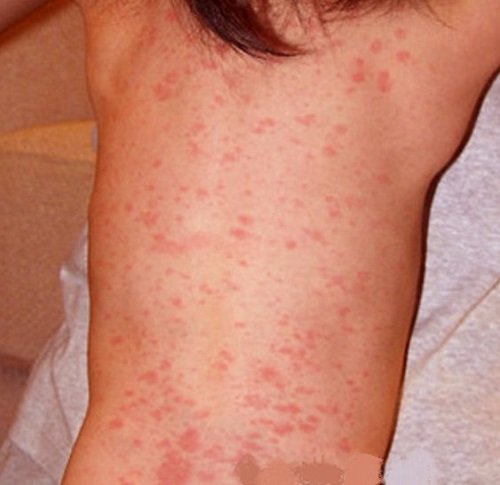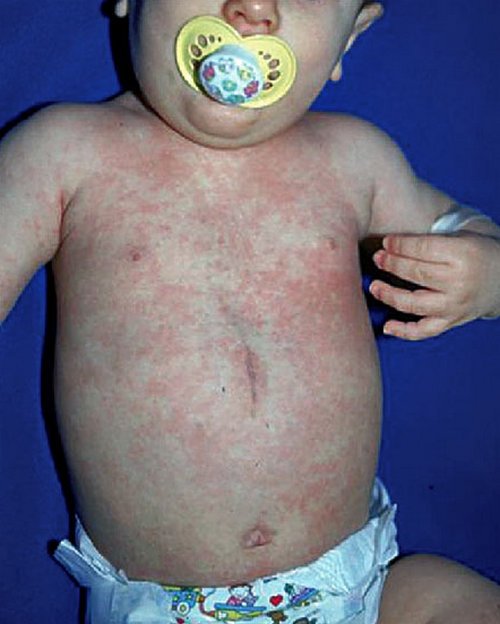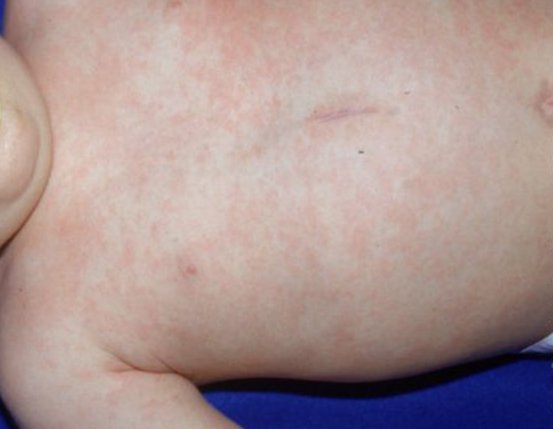Roseola Rash
What is Roseola Rash?
Roseola is a mild viral infection common in young children. It is also called sixth disease, exanthema subitum, and roseola infantum (2).
It is characterized by a sudden onset of high fever that lasts for about three to five days, nasal congestion, and loose stool.
Once the fever subsides, roseola rashes will appear. Diffuse maculopapular eruption (NOTE : usually sparing face). The rash could last for about two days and is not contagious. The condition usually resolves without any treatment. Roseola is primarily caused by Human Herpes Virus (HHV-6). It is sometimes caused by Human Herpes Virus 7 (HHV-7) (3).
Roseola Rash Pictures

Image 1 : A child with roseola rash at the back
Picture Source : healthosphere.com

Photo 2 : images.medicinenet.com
Picture Source : A baby with roseola rash in the chest and abdomen

Picture 3 : Flat, Pink raised bumps around 1.5 mm to 3 mm diameter is characteristic of ROSEOLA
Signs and Symptoms
- A sudden onset of high fever, which is greater than 39.4 Celsius
- Runny nose, cough, and slight sore throat
- Swollen lymph nodes in the neck
- A rash appears once the fever subsides, characterized by small pink spots. The spots are flat but sometimes raised with white ring around the spots.(3)
- The rash starts on the chest, abdomen, back, and spread to the arms and neck.
- The rash is not itchy and could last for hours to days
- Patient could also suffer from mild diarrhea, irritability especially in children, decreased appetite, and swollen eyelids (4).
Who are at risk?
- Older infants are at risk because their own antibody is not yet fully developed. Infants between six and fifteen months are at risk (1).
- If the child has a seizure disorder and gets infected with roseola, the child briefly lose consciousness along with jerking movement of the arms and legs.
- People with weak immune system are at risk, especially those who received a bone marrow and/or organ transplant. Those with weak immune system may suffer from serious complication like pneumonia and encephalitis.
How is Roseola spread?
As mentioned above, roseola rash is not contagious, but the disease itself can be spread from one person to another through transfer of oral secretions. The incubation period is nine to ten days (2). Roseola’s only natural host is human. The disease can affect a person anytime of the year without seasonal variation.
Does Roseola affect adults?
Roseola is common in young children, but could it also affect adults? About 90% of grown-ups developed antibodies (5) to roseola the moment they reach four years old, but still there is a possibility for adults to be at risk for the infection, especially if the immune system is compromised (3).
Can a pregnant woman suffer from Roseola?
Pregnant women are susceptible to infection (8) because it is during such time when the immune system is vulnerable to infection. There is a possibility that pregnant women can suffer from roseola and there are chances that it can be overlooked.
The good news is that roseola does not cause any congenital pregnancy infection (7). However, one must keep in mind that it is not good at all to be exposed to infection when pregnant. It could have a negative impact not just on the mother but to their child too.
Treating Roseola during pregnancy
The focus of care for pregnant women with roseola is to bring down the fever (8). There are various ways to do so such as taking plenty of fluids, putting damp cloth in the forehead, eat fresh food, and take plenty of rest. Do not take any medication without consulting your doctor.
Precautionary measures should be strictly observed. Pregnant women should avoid exposure to virus (7). Stay away from people who suffer from any forms of infection.
When should you consult your doctor?
If the fever gets too high, it could reach to its unmanageable level, which could lead to seizure. Closely monitor the fever of your child and seek medical attention right away if your child experienced chills and seizure (2).
If the fever has been on for more than seven days, then you have to inform your doctor. Usually, the roseola rash improves after a few hours or days. If it does not improve after three days, then you have to inform your doctor.
How to diagnose Roseola?
The signs and symptoms of roseola are somewhat similar to other common childhood illnesses (1), which makes it quite difficult to diagnose.
The doctor will assess the rash before making any diagnosis. A tell-tale rash is used to conform the diagnosis of roseola. A blood test is also performed to check for antibodies to roseola.
Drug Therapy in Patient with Roseola
For children, health experts usually recommend taking over the counter medications for fever like ibuprofen an acetaminophen. One should be very cautious in giving aspirin. It should not be taken by patient who suffering from chicken pox and flu-like symptoms.
In some cases, the doctor will prescribe antiviral medication to manage the infection effectively, especially those patients with weakened immunity.
How to Prevent Roseola?
- There is no vaccine yet to prevent roseola (1). Hence, you have to do the best you can to prevent roseola, especially if your immune system is compromised. One way of doing so is by avoiding being exposed to infected person. If your child has roseola, you have keep him away from other people to prevent the spread of infection.
- Make it a habit to wash your hands frequently to prevent the spread of infection. Hand washing is one of the best ways to prevent diseases.(6)
Managing Roseola at home
- Let the disease run its course like most viruses do.(5)
- Make sure you keep the temperature at a manageable range. Do everything you can to make your child comfortable, especially when the temperature is high.
- Let the patient have adequate sleep and rest.
- Increase the intake of fluids, especially clear fluids like water, sports drink and other electrolyte rehydration solution to prevent dehydration.(5)
- Give the patient a tepid sponge bath. Apply a cool washcloth on the patient’s forehead to somehow ease the discomfort brought by fever.
- You should avoid using ice or cold water to prevent chills.
- Avoid stress.
- Eat healthy foods, especially fruits and vegetables to help the body cope from roseola.
References:
- www.kidshealth.org/en/parents/roseola.html
- www.mayoclinic.org
- www.medicinenet.com
- www.babycenter.com
- www.webmd.com
- https://www.betterhealth.vic.gov.au
- www.babymed.com
- www.beingtheparent.com
Published by Dr. Raj MD under Uncategorized.
Article was last reviewed on August 6th, 2018.

